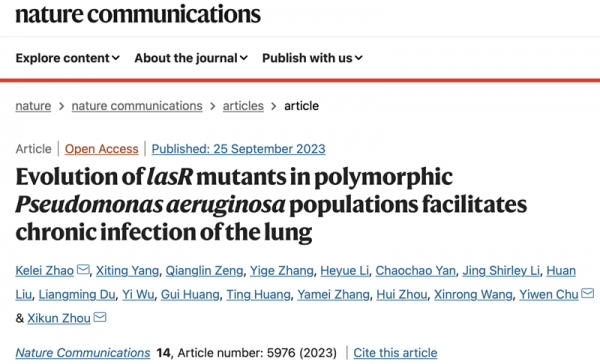On September 25, Zhao Kelei and Chu Yiwen from the College of Pharmacy at Chengdu University (CDU), along with Zhou Xikun from Sichuan University, collaboratively published a paper titled "Evolution of lasR mutants in polymorphic Pseudomonas aeruginosa populations facilitates chronic infection of the lung" in Nature Communications. This study reveals a new mechanism for Pseudomonas aeruginosa to persistently colonize the respiratory environment through evolution. This is a new breakthrough in the field of respiratory infection research following the study of Zhao Kelei's team on the mechanism of chronic respiratory infection caused by Pseudomonas aeruginosa mediated by novel virulence factors. Research Fellow Zhao Kelei is the first author and co-corresponding author of this paper, while Research Fellow Chu Yiwen and Research Fellow Zhou Xikun from the State Key Laboratory of Biotherapy at West China Hospital, Sichuan University are the co-corresponding authors.

Pseudomonas aeruginosa is a widely distributed gram-negative conditional pathogen that infect a wide range of animals and plants, and is particularly common in patients with weakened immune systems. Compared with other common clinical pathogenic bacteria, Pseudomonas aeruginosa has a relatively large genome and can adapt to the environment with complex intracellular regulatory mechanisms, including the initiation of acute and chronic infections in multiple tissues and organs, which frequently lead to the development of cystic fibrosis (CF) and chronic obstructive pulmonary disease (COPD). Chronic respiratory infection particularly manifests the characteristic of Pseudomonas aeruginosa.
Pseudomonas aeruginosa typically exhibits population heterogeneity characterized by the accumulation of multiple mutations during chronic infection. In particular, loss-of-function mutant strains of the quorum sensing-controlled gene (lasR) are frequently isolated from the respiratory samples of patients with CF and COPD. This polymorphic evolution is accompanied by dynamic changes in information exchange between individuals within the population, but the internal dynamics of this process and its impact on the immune system of hosts are not yet clear.

In collaboration with the Department of Respiratory and Critical Care Medicine at the Clinical Medical College & Affiliated Hospital of Chengdu University, Zhao's research team longitudinally acquired Pseudomonas aeruginosa from respiratory samples of patients with COPD. They analyzed phenotypic identification and phylogenetics, genotypes, and mutation trajectories by extracellular virulence factors, and investigated the contribution of lasR mutant strains to the stability of polymorphic populations and pathogenicity both in vitro and in vivo. The results showed that the adaptive evolution of Pseudomonas aeruginosa in the lung sequentially selects for strains with different types of extracellular product defects, and that the evolution of polymorphic populations is primarily reflected in the selection of lasR mutants. LasR mutants are preferentially selected, and a variety of other gene mutations, such as pvdS, continue to accumulate on these mutants.
Using game theory, the team further found that lasR and pvdS mutants could easily invade the original population in a deceptive manner, due to corresponding defects in extracellular products. These mutants can coexist with wild-type Pseudomonas aeruginosa under different conditions, forming an interaction known as cascading public goods game. Ultimately, polymorphic populations consisting of both complete and mutant LasR minimize fluctuations in the host's immune system and promote persistent colonization. This study demonstrates the multi-stage evolution and complex interactions of Pseudomonas aeruginosa during adaptation to the host's lung. It also provides an explanation for the maintenance of cooperative behavior in the public goods game.
As an open access journal under Nature, Nature Communications publishes high-quality research results in various fields of natural sciences. It is recognized as a top journal in SCI Zone I of the Chinese Academy of Sciences and is listed in the Nature Index. The latest impact factor for 2022-2023 is 16.6, with a five-year impact factor of 17. The journal publishes papers of great importance to specialists within each field.
Paper link: https://www.nature.com/articles/s41467-023-41704-w